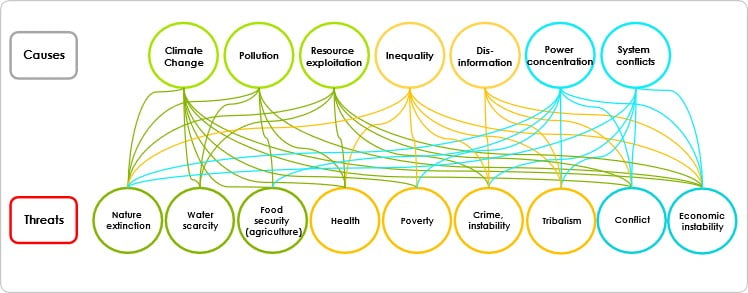
Implementing Sustainable Competitiveness
The Global Sustainable Competitiveness Index, published since 2012, measures the sustinability and competitiveness of countries based on more than 200 quantitative indicators, since 2012.
This article outlines the basic policies that allow countries to increase both sustainability and competitiveness
Where we are
Humanit as a whole is currently facing a number of crises, which our current systems seem unable to deal with :
- runaway climate change with heat waves, drought, wild-fires, storms rain-bombs, hail, and landslides. The combination of these extremes is already affecting our food security as we speak, getting worse, fast;
- the pollution of nearly everything;
- the extinction of nature through human infrastructure and human activities;
- ever bigger inequality between the haves and not-haves, in countries, and in between countries
- the concentration of more and more wealth and power in the hands of fewer and fewer corporations and individuals
- The threat of artifical intelligence gaining awareness, which would end AI’s need of humanity
Our systems have destroyed the nature upon which we depended for food and shelter, as well as the social fabric within and in between countries. We have destroyed what we depend upon to survive.
This is happening against the backdrop of increasing geopolitical tensions. We currently witness two mayor groups of systems, and the tensions between these two systems have been inceasingly steadily over the past decades, super-charged by misinformation on socila media. On one hand, we have what is often referred to as “liberal democraties” systems, the other group referred to as autocratic systems, controlled by a single person/family/party.Neither of these two systems are capable with the challenges we are facing:

Where we want to go:
A world in which the above problems are solved.
Sustainable Competitiveness
Sustainable competitiveness is the ability to generate and sustain inclusive wealth without diminishing the future capability of sustaining or increasing current wealth levels.
How we get there
These are 13 key policies that could get us to “sustainable competitiveness”:
- Global climate pricing with money-back
Taxing all climate emissions, globally at the same level. Return 50% in cash to the people, use 40% to build renewable infra, and 10% for adaption/mitigation - Internalising all external costs
Integrate all external environmental and human health costs of substances/processes in the price, globally co-ordinated - More democracy
Proportional voting, no more winner takes it all; ministries are allocated according to voter share. Regular referenda on decisive issues to hold politics accountable - Better governance
Eliminate power concentration in a single person: no more PMs and Presidents; the ministries form the executive. Equally, no more CEOs in the private economy; the head of departments form the executive. - Working financial markets
The markets need to work for the economy, not vice-versa. Eliminate perception-driven bubbles and short-term rent seeking by introducing minimum holding time and/or transaction fees. New financial instruments need to be examined against adverse impacts before approval. - Education, education, education – quality education for all
Increasing educational spending, allocated at the state level to ensure equal education for all with higher focus on vocational training. Education is based on science – and nothing else then science - Fact-based, impartial information
Social media accounts and posting on any on-line channel is only possible only with verified human identity, imediatly eliminating all bot-driven propaganda that distorts reality . Tax-financed, impartial information networks, not controlled by government, based on science. Ban on all electronic political advertisement. Force apps to include relevant public information on all feeds or block their IPs. - Health care and social security for all
Essential health care and social security are financed through salary-deducted percentage of income - Impartial and efficient justice system accessible to all
Impartial staff in fast processes, enabling access to legal rights to all while minimising abuse - Unitary Taxing
Globally agreed bracket for tax rates for individuals and entities, and process of taxing multi-national corporations. Increasing the marginal tax rate - Freedom for, and from, religion
Faith is a choice. Science is not. Everybody is free to practice their faith, and nobody has their freedom impaired by other people’s faith. Total separation of state governance and religion. - Total equality
Total equality – between genders, races, regions, nationality, wealth - Climate emergency management:
Nationalising food supply chains; investing in high-tech and nature-based agricultural solutions, end food waste, convert agricultural land used for animal feed to crops for human consumption, heat protection through greening cities, increase water efficiency, increasing water availability



